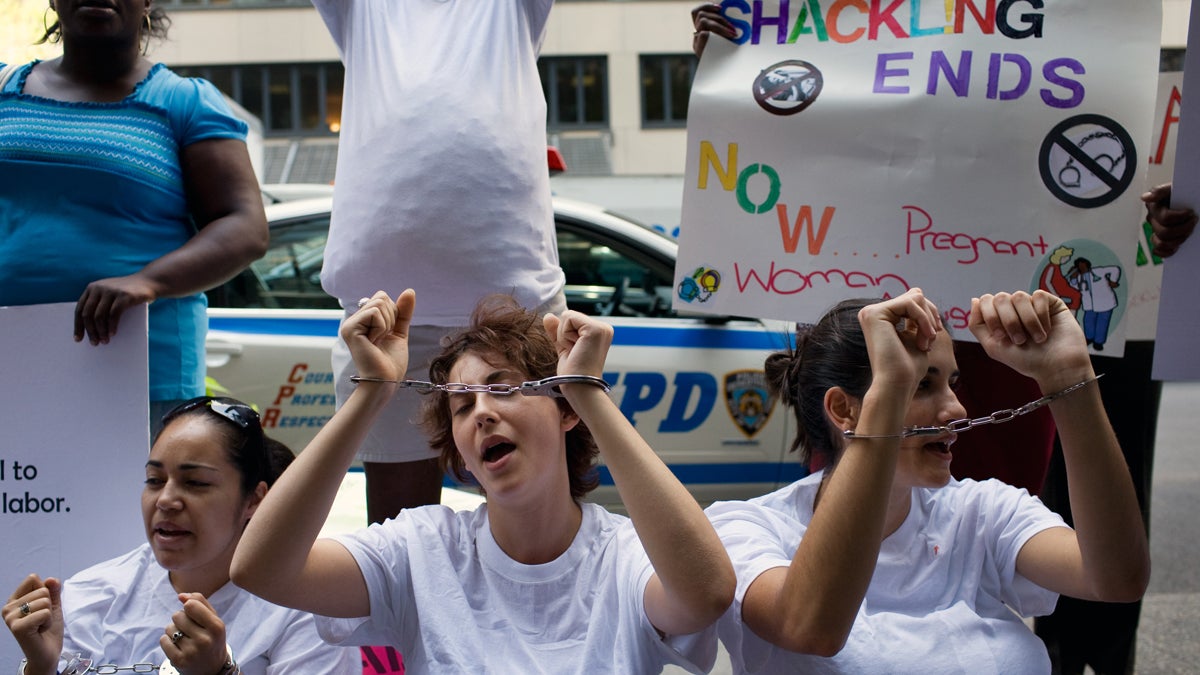ACLU alleges widespread, illegal shackling of pregnant inmates

In this Aug. 18
A new report by the Pennsylvania American Civil Liberties Union alleges pregnant prisoners have been illegally shackled by jails and prisons around the state.
In 2010, Pennsylvania banned the shackling and restraint of inmates in their second or third trimesters in a number of cases, including labor, delivery, prenatal care visits and transportation to hospitals. There are rare exceptions to the rule, such as when prisoners present a flight or security risk.
Through public-records requests, the ACLU found that most county and state-run correctional facilities in Pennsylvania have policies that comport with the law. However, according to interviews with approximately 100 staffers at 26 hospitals between 2011 and 2013, many jails and prisons are not following their own guidelines.
Doctors and nurses reported that women in their second and third trimesters were being restrained and handcuffed regularly during prenatal testing, transportation and even deliveries, according to the ACLU.
“We found very widespread lack of knowledge about the law and also widespread and continued use of restraints,” said Carol Petraitis, director of the Pennsylvania ACLU’s Clara Bell Duvall Reproductive Freedom Project.
Prison officials across the state strongly disputed the findings, with one calling the report “fictitious.”
The ACLU also said that many correctional facilities are not disclosing when they use shackles, in violation of the law.
In 2012-13, women’s jails reported 109 incidents of restraint. The report estimates that between 328 and 820 incidents actually occurred in that period.
The report does not include a list of jails that allegedly violated the law. However, the ACLU did highlight one correctional facility in a letter to Pennsylvania Attorney General Kathleen Kane, which asked her to provide guidance on the anti-shackling law to prison and hospital employees.
“One incident in February 2011 involving the improper use of restraints on a pregnant Allegheny County Jail inmate was particularly egregious,” the letter said. “The woman, who was seven months pregnant, was subjected to the routine use of leg and waist restraints during transport. …The restraints caused her to trip and fall face down.”
Allegheny County spokeswoman Amie Downs issued a statement disputing the report: “Our policies and procedures are based on, and consistent with, all applicable law.”
Susan Bensinger, a spokeswoman for Pennsylvania’s Department of Corrections, also contested the ACLU’s findings and said the state is complying with the law.
Louis Giorla, the Philadelphia prisons commissioner, criticized the report for lacking specifics, such as the names of hospital staffers interviewed and the dates of the alleged violations.
“Fourth-party conversations with nurses [and] technicians who are unnamed, unidentified and who have made no complaints just seems not only disingenuous, but, I’m sorry, it seems fictitious,” he said.
Petraitis said the hospital employees are not named to protect their identities. She also defended the ACLU’s reliance on hospital staffers, a decision she said was backed by health care experts at Duquesne University.
“We went to the hospitals and talked to the nurse managers who had direct knowledge,” she said. “It also guaranteed their anonymity.”
The Attorney General’s office said it is reviewing the ACLU’s request.
WHYY is your source for fact-based, in-depth journalism and information. As a nonprofit organization, we rely on financial support from readers like you. Please give today.

